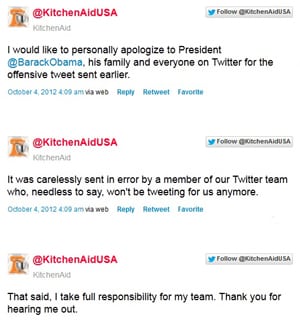 When a social misstep happens, unintentional or not, Ellis said, retailers need to own up to the error, apologize, and move on. “You don’t feed the trolls,” she said, “apologize and that is it.”
When a social misstep happens, unintentional or not, Ellis said, retailers need to own up to the error, apologize, and move on. “You don’t feed the trolls,” she said, “apologize and that is it.”
Feeding the trolls, Ellis said, will usually start an unappealing debate within your brand on a social media site and, ultimately, make the retailer look bad in the eyes of the customer.
“You always want to leave in the good graces of your customer,” she said.
One of the benefits of social media for brands is that it gives them a chance to reach so many customers and fans in an immediate fashion. Retailers can use Twitter, Facebook, and Pinterest, to unveil new products, offer coupons, and allow the customer to reach out in a whole new way. But, it can backfire.
If a customer is unhappy with your brand, they will most likely hit Facebook or Twitter to tell the masses about their negative experience. When this happens, and it will happen, the worst thing you can possibly do is ignore it, says Jeannie Walters, chief customer experience investigator and founder of 360 Connext.
When an unhappy customer brings up a negative experience, retailers need to realize that these customers are the ones who are engaged the most. If you address their concern, apologize, and remedy the situation publicly, you have a high probability of gaining that customer’s loyalty back, Walters said.
In order to prepare for the mishaps, Ellis said, retailers “need to have a social media policy that includes specific steps for responding to an online attack. This helps expedite the response and minimize the damage.”
Engaging with your customers through social media, Ellis said, is not only a great way to gain customers but also gives the retailer “early warning” on mishaps that might occur. The beauty of social media is that retailers can see what works and what doesn’t in real time.
When a mishap does occur, Ellis suggests that retailers “respond quickly and sincerely. If it was a mistake or foot-in-mouth event, apologize and ride out the storm.”
 This issue happened with KitchenAid last fall when a member of its social media team inadvertently posted an anti-President Barack Obama tweet during the 2012 Presidential debates thinking it was their own personal Twitter account.
This issue happened with KitchenAid last fall when a member of its social media team inadvertently posted an anti-President Barack Obama tweet during the 2012 Presidential debates thinking it was their own personal Twitter account.
KitchenAid quickly issued a series of apologetic tweets not only addressing the error but also taking full responsibility. “It was carelessly sent in error by a member of our Twitter team who, needless to say, won’t be tweeting for us anymore,” the tweet read.
Lastly, Ellis said, retailers using social media should realize that their Facebook page, their Twitter page, or their Pinterest page is theirs to run not a social free for all for customers. “If someone is posting inappropriate content on your pages, respond to the first message, ask him or her to stop at the second one, and remove the rest and report the person to the platform,” Ellis said.